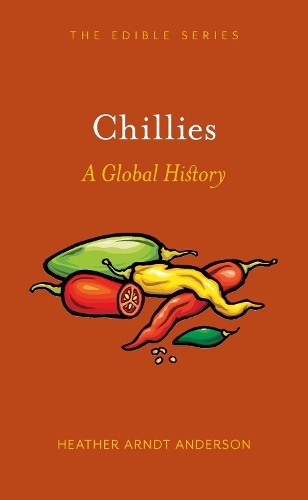
Chillies: A Global History
(Hardback)
Publishing Details
Chillies: A Global History
By (Author) Heather Arndt Anderson
Reaktion Books
Reaktion Books
19th September 2016
1st September 2016
United Kingdom
Classifications
General
Non Fiction
641.3384
Physical Properties
Hardback
152
Width 197mm, Height 120mm
340g
Description
Despite their fearsome reputation, chillies have helped to shape the identities of innumerable world cuisines. Chillies traces the culinary journey of the spice and uncovers cultural and spiritual links between chillies and humans, from their use as an aphrodisiac, to the recent discovery that chilli heat shows promise as a treatment for neuropathic pain, prostate cancer and leukaemia. It also makes a compelling link between the history of global trade and conflict and the spread of spicy cuisine worldwide. Peppered with lively anecdotes and details of chilli taxonomy and ecology, this entertaining history is sure to spice up your bookshelf.
Reviews
"Chillies, a new book from the "Edible" series, packs significant information into a tiny volume. Renowned food writer Anderson provides an authoritative, thorough, well-researched, readable history of chili peppers, their discovery by Europeans, their use in the Americas, and their utilization in European, Asian, African, and Latin American food cultures and medicinal traditions. The author speaks to the great diversity of chili peppers, the Scoville scale to measure heat, and the reasons chili peppers, though painful for some, have become so pleasurable to millions around the world. On a graver note, the book also speaks to the broader picture of globalization and world trade, making ambitious parallels between the exchange of New World foodstuffs for colonization, slavery, and European cultural domination. Plentiful illustrations from historical documents, herbals, travel documents, and cookbooks complement the volume, along with a section of recipes and a list of organizations that promote the use of chili peppers. Recommended."-- "Choice"
Author Bio
Heather Arndt Anderson is a food writer based in Portland, Oregon, and the author of Breakfast: A History (2013).
